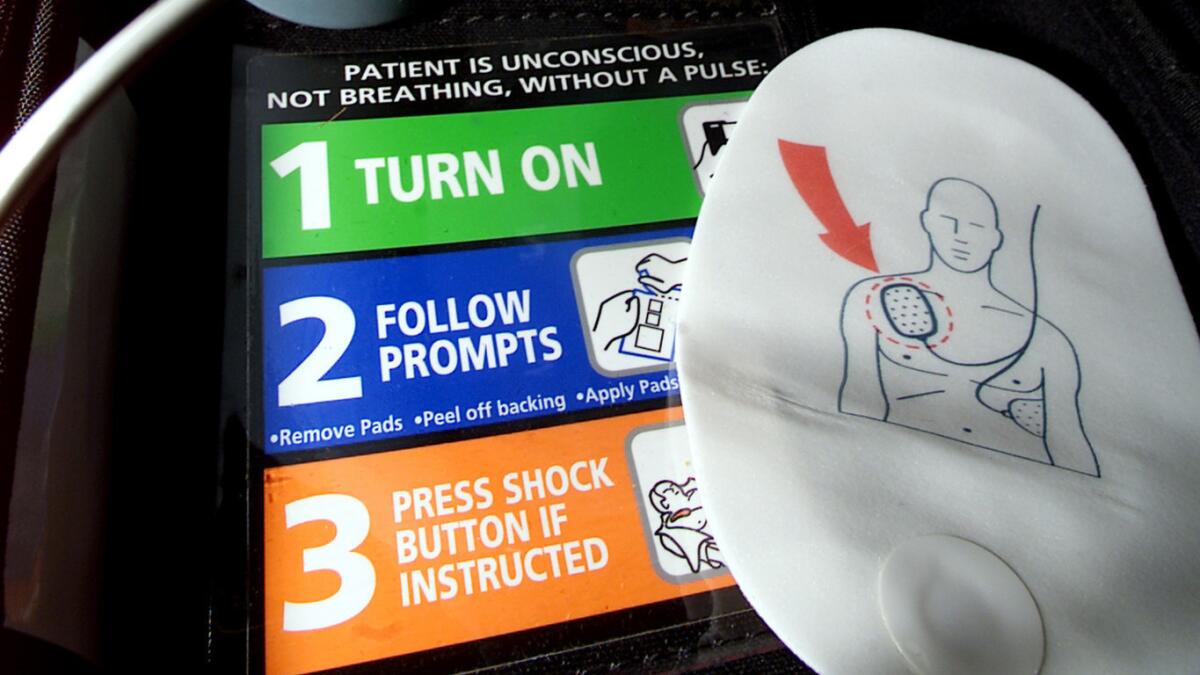Confidential L.A. County audit another blow to Compton Fire Department

A simple automated external defibrillator made by Laerdal which can deliver an emergency life-saving jolt to a cardiac arrest sufferer. County regulators ordered the Compton Fire Department to remove similar devices off some ambulances and firetrucks.
- Share via
The Compton Fire Department has failed to properly document emergency medical care and monitor the training and performance of the city rescuers who respond to 911 calls for help, according to a confidential audit obtained by The Times.
The six-page audit, delivered to the department in February by county regulators, follows a series of Times reports on breakdowns at the fire agency that prompted city leaders to launch an investigation and place the department’s chief on leave.
The audit criticized Compton paramedics for failing to complete nearly a dozen different types of medical records after delivering emergency care and directs top department officials to launch a broad retraining effort.
The fire agency was also cited for failing to follow rules designed to identify poor performing medics so they can be retrained or potentially disciplined.
“As a department, we’ve become a little relaxed,” said Bryan Batiste, who was appointed interim fire chief last week. “The oversight just needs to be stronger. Everybody has to do their job or else.”
Compton’s previous chief, Jon Thompson, was placed on leave last week after the disclosure that some city firetrucks and ambulances were stripped of defibrillators, a crucial lifesaving device that rescuers use to deliver a shock to try to restart the heart of a cardiac arrest victim.
County regulators forced fire officials to remove the machines after the city was unable to produce documentation showing that firefighters had been properly trained to use the equipment.
That decision followed a Times report in March that nearly one in four Compton firefighters lacked a permit to perform emergency medical care, a key credential required by other local fire agencies.
Batiste said he submitted paperwork on Monday to begin the process of restoring the defibrillators.
He said he also plans to use city funds to hire a nurse to begin the work of rebuilding the agency’s oversight and retraining program, which he said was hampered by budget cuts in recent years.
“We’ll get there one way or the other,” he said.
Last week city leaders said a retired fire chief, Rico Smith, would lead an effort to fix the department’s problems.
But hiring rules prevented Smith from being appointed while Thompson is on leave pending the city investigation, officials said. Smith may now act as a consultant to the department, according to Batiste.
The audit was conducted by Los Angeles County’s Emergency Medical Services Agency, which oversees 911 care in the area. Each year its investigators review local fire departments that respond to calls for medical help.
The reports are not routinely published and officials consider them exempt from disclosure under California’s public records law.
“Being open, it would harm this process,” said Cathy Chidester, the head of the county oversight agency.
Chidester said her agency lacks the legal authority to make investigations mandatory and that publicizing negative results could discourage participation.
“We try not to be controversial with the departments,” she said. “We would get much more pushback on our audits about what they would allow us to look at or not look at.”
Choosing to keep the audits secret is legal under state law, according to Peter Scheer, head of First Amendment Coalition, a group advocating for greater opening of government. But nothing prevents agencies from voluntarily releasing the reports, he said.
“Given that these services are largely paid for by local taxpayers, EMS agencies should release the audits, or information and recommendations from them, whenever they can,” Scheer said.
For the latest on this developing story follow @palewire.
More to Read
Sign up for Essential California
The most important California stories and recommendations in your inbox every morning.
You may occasionally receive promotional content from the Los Angeles Times.










